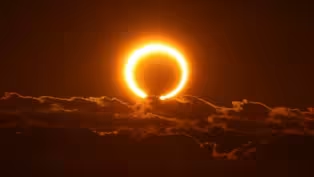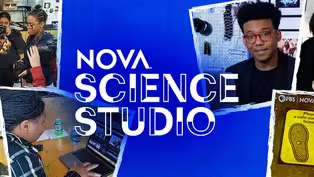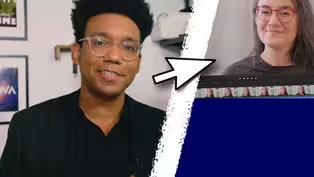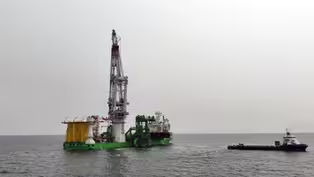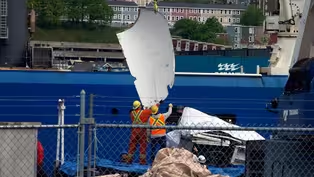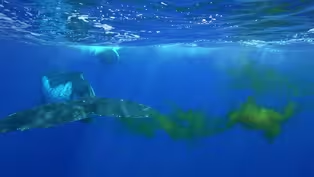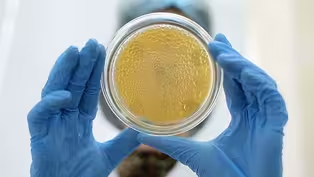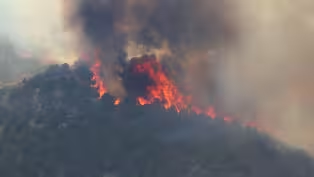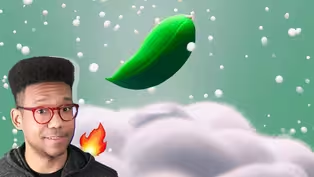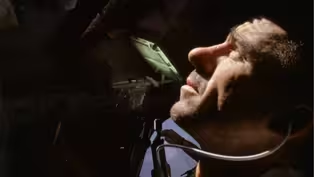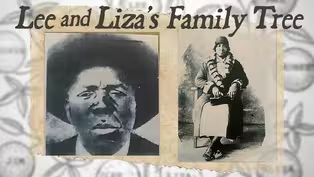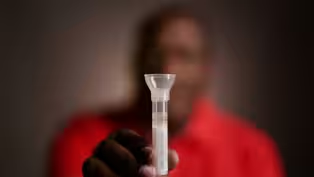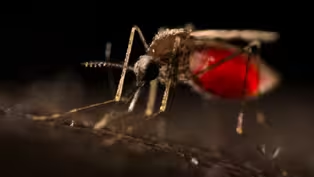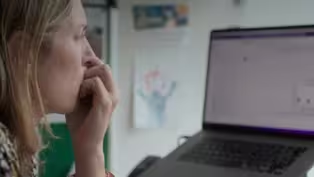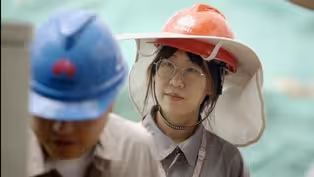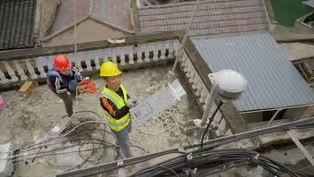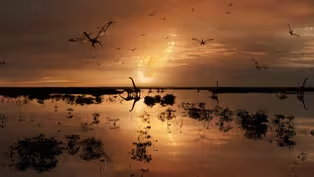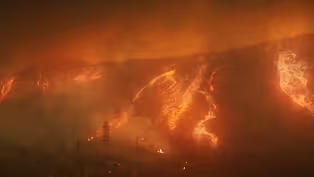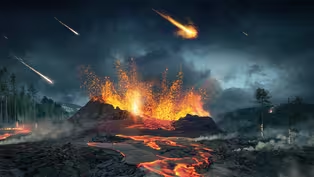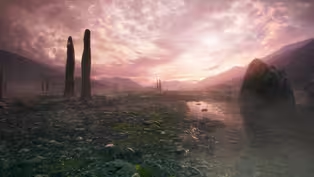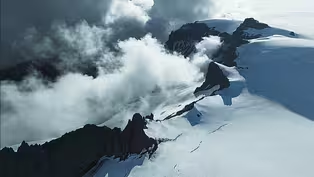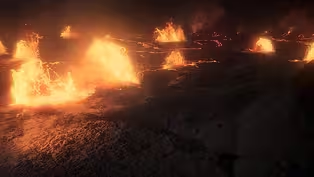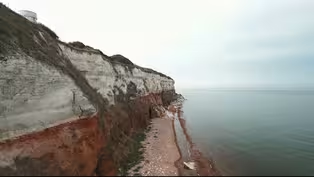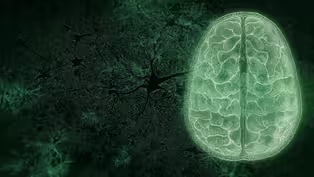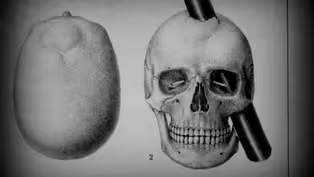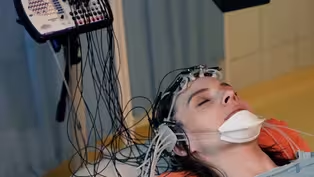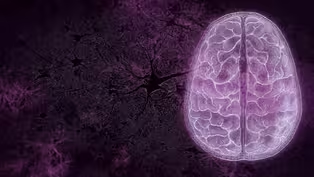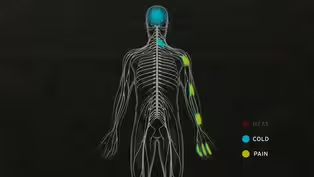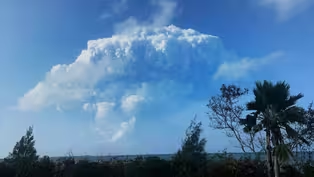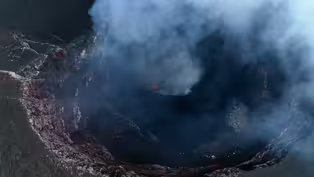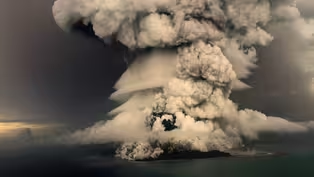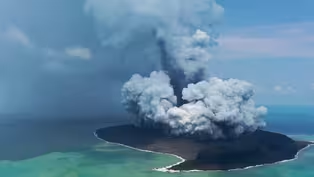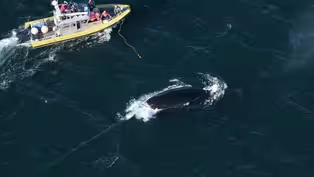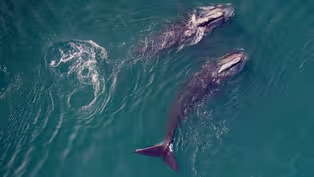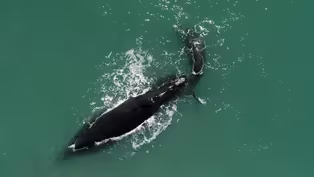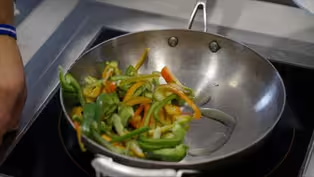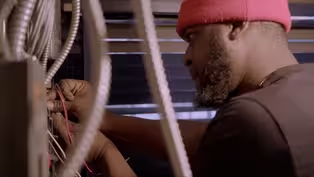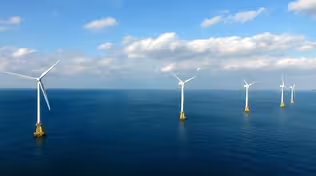
This Fungus Is Spreading Rapidly in Hospitals
Clip: Season 50 | 3m 24sVideo has Closed Captions
Cases of Candida auris are increasing every year.
Most fungi can’t grow and reproduce in the human body because it’s too warm. But experts say they’re evolving.
Problems playing video? | Closed Captioning Feedback
Problems playing video? | Closed Captioning Feedback
National Corporate funding for NOVA is provided by Carlisle Companies and Viking Cruises. Major funding for NOVA is provided by the NOVA Science Trust and PBS viewers.

This Fungus Is Spreading Rapidly in Hospitals
Clip: Season 50 | 3m 24sVideo has Closed Captions
Most fungi can’t grow and reproduce in the human body because it’s too warm. But experts say they’re evolving.
Problems playing video? | Closed Captioning Feedback
How to Watch NOVA
NOVA is available to stream on pbs.org and the free PBS App, available on iPhone, Apple TV, Android TV, Android smartphones, Amazon Fire TV, Amazon Fire Tablet, Roku, Samsung Smart TV, and Vizio.
Buy Now
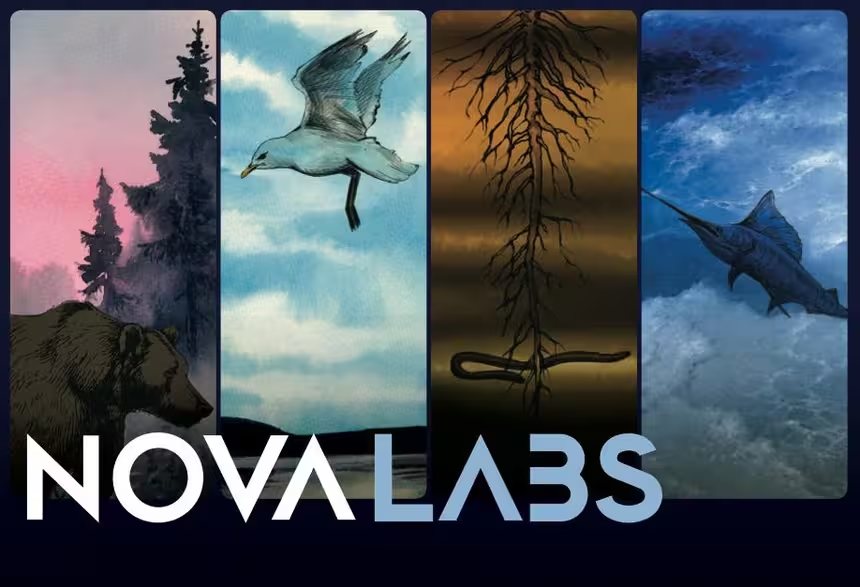
NOVA Labs
NOVA Labs is a free digital platform that engages teens and lifelong learners in games and interactives that foster authentic scientific exploration. Participants take part in real-world investigations by visualizing, analyzing, and playing with the same data that scientists use.Providing Support for PBS.org
Learn Moreabout PBS online sponsorship- [Narrator] Cases of a deadly fungal infection are increasing, and this might be caused by climate change.
That may sound like the plot of "The Last of Us," but fortunately this fungus called Candida auris, is not going to hijack your body and turn you into a zombie.
It is unusual, though.
Until now, human bodies have been too warm for most fungi to grow and reproduce, but experts think the fungi have evolved and are becoming more of a threat.
- The fungi in the environment are being exposed to climate change and as those fungi begin to adapt to higher temperatures, we're gonna lose the protection.
- [Narrator] Cases of Candida auris have been reported in over 28 states and are rapidly increasing year over year.
- Where there was a 44% increase in 2019, there was a 95% increase in 2021.
That's what makes it concerning.
- [Narrator] The fungus can lead to severe infection and can infect any body part, including the blood.
It can survive on the skin and shed into the environment and contaminate surfaces.
- This increase didn't just happen in areas where they've had C. auris, but it also occurred in areas that previously didn't have any transmission or areas that had not had any prior cases.
- [Narrator] It's not just climate change fungi are adapting to.
- Candida auris is just one of many organisms that's displaying increasing antimicrobial resistance.
- [Narrator] Antimicrobial resistance is when organisms like bacteria and fungi build a tolerance to drugs that in the previous years, could have worked as treatment.
- Mutations develop in their genetic makeup that make it so the drugs no longer work.
- [Narrator] Candida auris is challenging to treat because it's resistant to one of the three common antifungal treatments.
One class of drugs called echinocandins has been the most effective in treating the fungus, although not in every case, and a small percentage of Candida auris samples have been found to be resistant to that too.
- We have not seen a lot of resistance to echinocandins yet, so it's considered the first line treatment for infections, but we are seeing more cases that have echinocandin resistance or resistance to all three main classes.
- [Narrator] Candida auris is so far mostly contained to healthcare settings, in elderly patients, people with weakened immune systems, and patients that require invasive medical devices like catheters and breathing tubes.
- This is really not a problem for the general public.
This is really a problem for people who are in the hospital for long periods of time, in and out of the hospital, very sick, often in the ICU with devices.
- [Narrator] But could this spread outside of healthcare facilities?
- I think the concern, and I emphasize that it's not happening today, is whether this kind of infection can spill out into the community.
I don't know if that's gonna happen, but the organism is changing rapidly and if that was to happen, then we would have a much bigger problem than we have today.
- We don't want people to think that spread is inevitable and be hopeless.
We want healthcare providers and healthcare facilities to stay motivated and realize that there's a lot that can be done to prevent spread.
(upbeat music)
What to know about the “Ring of Fire” Eclipse
Video has Closed Captions
Clip: S50 | 46s | The "Ring of Fire" eclipse is coming. Seriously, don’t look directly at it. (46s)
Mastering Lighting and Audio in Video | NOVA Science Studio
Video has Closed Captions
Clip: S50 | 4m 4s | Elevate lighting and audio with these techniques to highlight creative storytelling (4m 4s)
Introducing the NOVA Science Studio Program
Video has Closed Captions
Clip: S50 | 2m 42s | The NOVA Science Studio is a youth science journalism program for high school students. (2m 42s)
How To Film Great Video With A Phone | NOVA Science Studio
Video has Closed Captions
Clip: S50 | 3m 54s | NOVA producer Alex Clark shares 3 fundamentals of shooting with a smartphone. (3m 54s)
How To Do A Video Interview | NOVA Science Studio Tutorial
Video has Closed Captions
Clip: S50 | 3m 56s | Interviewing is one of the most important parts of creating compelling videos (3m 56s)
Complete Guide To Editing | NOVA Science Studio Tutorials
Video has Closed Captions
Clip: S50 | 16m 21s | Learn editing tips and techniques to ensure a cohesive story from start to finish (16m 21s)
Rare Fossil Appears to Show Mammal Attacking Dinosaur
Video has Closed Captions
Clip: S50 | 3m 26s | Could a small mammal take down a dinosaur? (3m 26s)
The nation’s first big offshore wind farm is coming
Video has Closed Captions
Clip: S50 | 5m 22s | The first commercial-scale offshore wind farm in the US is being built off Massachusetts. (5m 22s)
What Made the Titan Submersible Design Unconventional?
Video has Closed Captions
Clip: S50 | 5m 5s | An international investigation into the fatal submersible implosion is underway. (5m 5s)
Could Whale Poop Help Cool the Planet?
Video has Closed Captions
Clip: S50 | 2m 43s | Marine biologists unravel how whales and their poop trap carbon and feed the ocean. (2m 43s)
This Fungus Is Spreading Rapidly in Hospitals
Video has Closed Captions
Clip: S50 | 3m 24s | Cases of Candida auris are increasing every year. (3m 24s)
There’s Something Living in Wildfire Smoke
Video has Closed Captions
Clip: S50 | 1m 59s | Wildfire smoke can carry harmful microorganisms long distances. (1m 59s)
How the West Is Making It Rain, With Science
Video has Closed Captions
Clip: S50 | 6m 22s | A method of boosting snow and rainfall may help ease drought conditions in the western US. (6m 22s)
Soothing Science: The Light You See at Sunset
Video has Closed Captions
Clip: S50 | 8m 1s | Relax to the sound of the ocean and discover the science behind sunsets. (8m 1s)
The Mystery and Physics of the Spiral Football Pass
Video has Closed Captions
Clip: S50 | 3m 43s | The way the spiral football pass travels through the air baffled physicists for years. (3m 43s)
Astronaut Walter Cunningham on the Historic Apollo 7 Mission
Video has Closed Captions
Clip: S50 | 32m 26s | He discussed the first crewed Apollo mission, Apollo 7, with NOVA in 1998. (32m 26s)
Lee and Liza's Family Tree Preview
Video has Closed Captions
Preview: S50 Ep18 | 30s | A family turns to science in their struggle to rediscover a history obscured by slavery. (30s)
Can DNA technology Help Rebuild a Family Tree?
Video has Closed Captions
Clip: S50 Ep18 | 3m 28s | A Black family uses DNA technology to unlock secrets of the past. (3m 28s)
Why Mosquitos Are Humanity’s Deadliest Creature
Video has Closed Captions
Clip: S50 Ep17 | 3m 37s | About 80% of deaths caused by Malaria annually are young children, below the age of five. (3m 37s)
Inside the Fight To Develop a Malaria Vaccine
Video has Closed Captions
Clip: S50 Ep17 | 4m 18s | These scientists were on the verge of a breakthrough with a promising vaccine nearing approval. (4m 18s)
Video has Closed Captions
Clip: S50 Ep17 | 2m 34s | Today, Malaria is considered a tropical disease, but it wasn’t always that way. (2m 34s)
Inside Huawei: China’s Tech Giant
Video has Closed Captions
Clip: S50 Ep16 | 3m 40s | Working at Huawei can be intense - six day weeks and 12 hour days are the norm. (3m 40s)
Inside China's Tech Boom Preview
Video has Closed Captions
Preview: S50 Ep16 | 30s | The inside story of China’s meteoric rise to the forefront of global innovation. (30s)
Video has Closed Captions
Clip: S50 Ep16 | 4m 28s | A tech war between China and the West is starting to heat up. (4m 28s)
What Caused the Dinosaurs to Go Extinct?
Video has Closed Captions
Clip: S50 Ep15 | 1m 50s | How did an asteroid impact on one side of the planet cause global devastation? (1m 50s)
The Catastrophe That Killed 90% Of Earth’s Species
Video has Closed Captions
Clip: S50 Ep14 | 1m 34s | An ancient catastrophe killed nearly all life on Earth - and an asteroid wasn’t to blame. (1m 34s)
Ancient Earth: Inferno Preview
Video has Closed Captions
Preview: S50 Ep14 | 30s | How did life bounce back after a cataclysmic extinction wiped out some 90% of all species? (30s)
Giant Prehistoric Fungi Once Ruled the Earth
Video has Closed Captions
Clip: S50 Ep13 | 3m 43s | Fossils show that millions of years ago, 20-foot-high fungi grew on Earth. (3m 43s)
How Life Survived When Earth Was Covered in Ice
Video has Closed Captions
Clip: S50 Ep12 | 3m 6s | Hundreds of millions of years ago, Earth was encased in ice. How did life survive? (3m 6s)
Video has Closed Captions
Clip: S50 Ep11 | 3m 9s | For millions of years, Earth was a fiery hellscape, inhospitable to life. (3m 9s)
Ancient Earth May Have Had Red Oceans
Video has Closed Captions
Clip: S50 Ep11 | 3m 34s | On Ancient Earth, rust deep in the oceans played a critical role in the formation of Earth (3m 34s)
Your Brain: Who's in Control? Preview
Video has Closed Captions
Preview: S50 Ep10 | 29s | Dive into the subconscious to see what’s really driving the decisions you make. (29s)
What If Part of Your Brain Was Missing?
Video has Closed Captions
Clip: S50 Ep10 | 2m 29s | An injury cost Phineas Gage part of his brain, but he lost something else too. (2m 29s)
What Happens in the Brain When you Sleepwalk?
Video has Closed Captions
Clip: S50 Ep10 | 3m 55s | Some people can do complex behaviors like walking and driving while sleeping. (3m 55s)
How Trauma Can Alter Your Biology
Video has Closed Captions
Clip: S50 Ep10 | 4m 40s | Your ancestors' experiences might influence how your brain is wired today. (4m 40s)
Your Memories Are Not as True as You Think
Video has Closed Captions
Clip: S50 Ep9 | 3m 51s | It turns out memories have a very shaky foundation. (3m 51s)
Your Brain: Perception Deception Preview
Video has Closed Captions
Preview: S50 Ep9 | 29s | Neuroscientists discover the tricks and shortcuts the brain takes to help us survive. (29s)
Is the Human Brain Actually Two Minds?
Video has Closed Captions
Clip: S50 Ep9 | 5m 17s | Severing the connection between the two halves of the brain reveals how the hemispheres function. (5m 17s)
Video has Closed Captions
Clip: S50 Ep9 | 3m 40s | This experiment shows how the brain can interpret — and misinterpret— pain. (3m 40s)
How Your Brain Interprets Color
Video has Closed Captions
Clip: S50 Ep9 | 2m 24s | A vision scientist breaks down the infamous dress debate. (2m 24s)
Witnesses Recount Surviving a Volcanic Explosion
Video has Closed Captions
Clip: S50 Ep8 | 2m 57s | Hear witnesses share how they survived the most explosive event ever recorded on Earth. (2m 57s)
Scientists Make Rare Discovery in Active Volcano
Video has Closed Captions
Clip: S50 Ep8 | 2m 58s | Volcanologists visit Tofua to study the volcano’s activity. (2m 58s)
How an Underwater Volcano Produced a 60-Foot Tsunami
Video has Closed Captions
Clip: S50 Ep8 | 2m 35s | The most explosive event ever recorded on Earth—and the massive tsunami that followed. (2m 35s)
Video has Closed Captions
Preview: S50 Ep8 | 30s | Investigate one of the most powerful volcanic eruptions in recorded history. (30s)
Scientists Attempt To Free Entangled Right Whale
Video has Closed Captions
Clip: S50 Ep7 | 3m 30s | Entanglement responders work to free a critically endangered whale from rope. (3m 30s)
Saving the Right Whale Preview
Video has Closed Captions
Preview: S50 Ep7 | 27s | Follow scientists determined to save the critically endangered right whale. (27s)
Meet Snow Cone the Right Whale and Her Calf
Video has Closed Captions
Clip: S50 Ep7 | 4m 32s | Since 2010, the average time between North Atlantic right whale births has increased. (4m 32s)
Why Induction Stoves Are Better for You and the Environment
Video has Closed Captions
Clip: S50 Ep6 | 2m 56s | Induction stovetops are an energy-efficient alternative to traditional gas stoves. (2m 56s)
How Heat Pumps Can Help Cities Lower Carbon Emissions
Video has Closed Captions
Clip: S50 Ep6 | 4m 17s | Landlords are switching from gas furnaces to heat pumps to reduce their carbon footprint. (4m 17s)
Chasing Carbon Zero Sneak Peek
Video has Closed Captions
Clip: S50 Ep6 | 1m | A new film from NOVA examines technologies that could get us to carbon zero by 2050. (1m)
Providing Support for PBS.org
Learn Moreabout PBS online sponsorship
- Science and Nature

Capturing the splendor of the natural world, from the African plains to the Antarctic ice.













Support for PBS provided by:
National Corporate funding for NOVA is provided by Carlisle Companies and Viking Cruises. Major funding for NOVA is provided by the NOVA Science Trust and PBS viewers.


